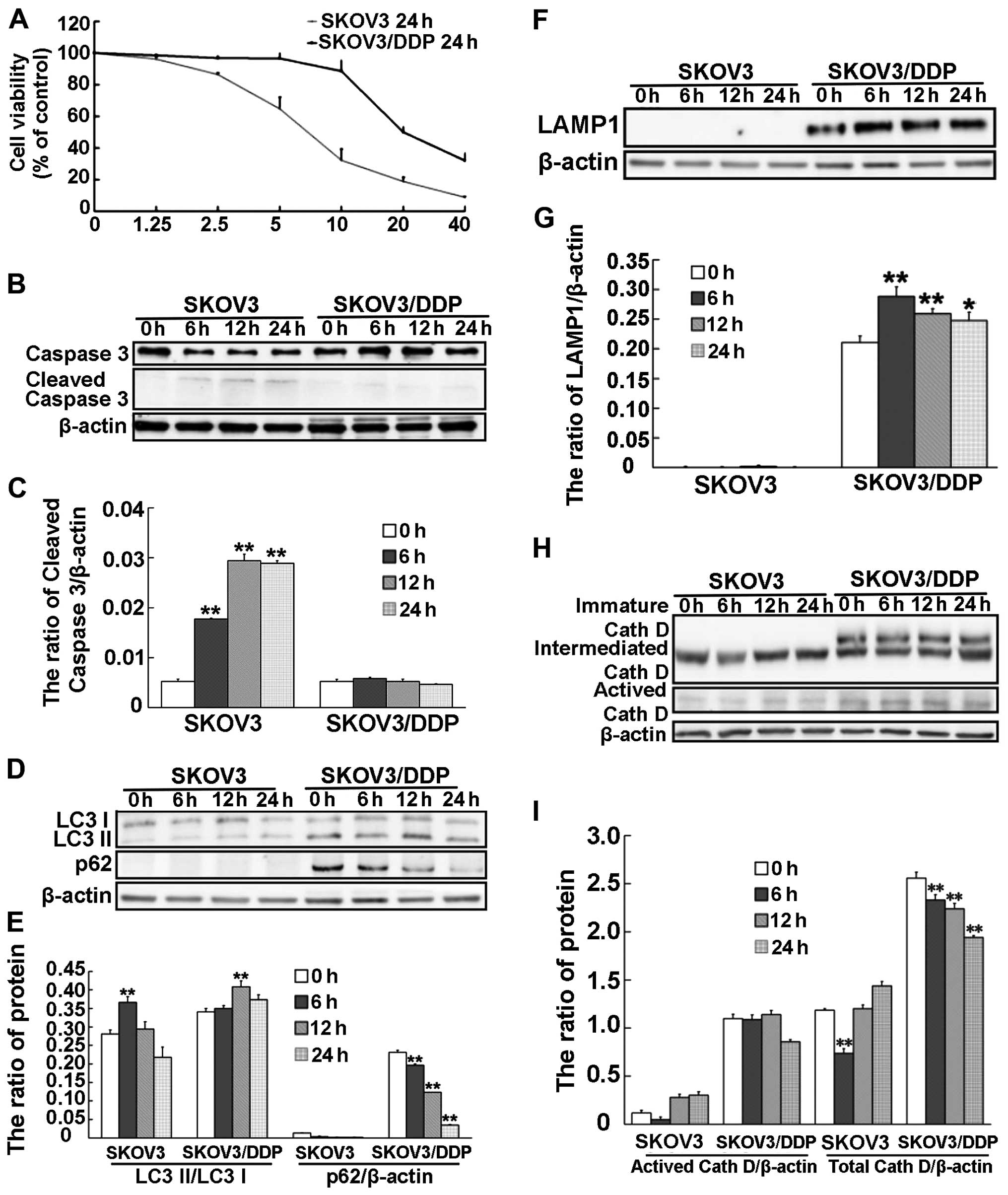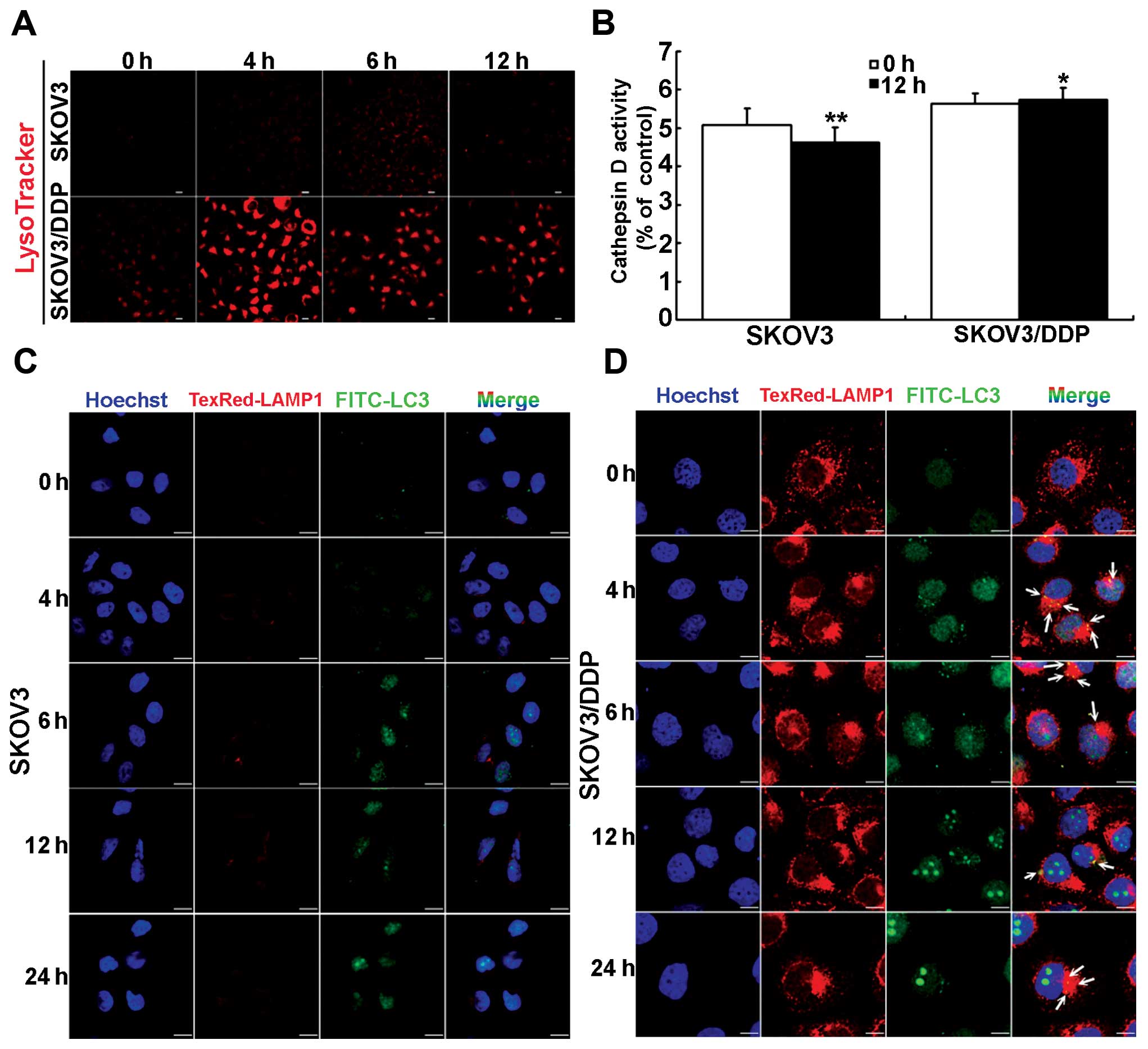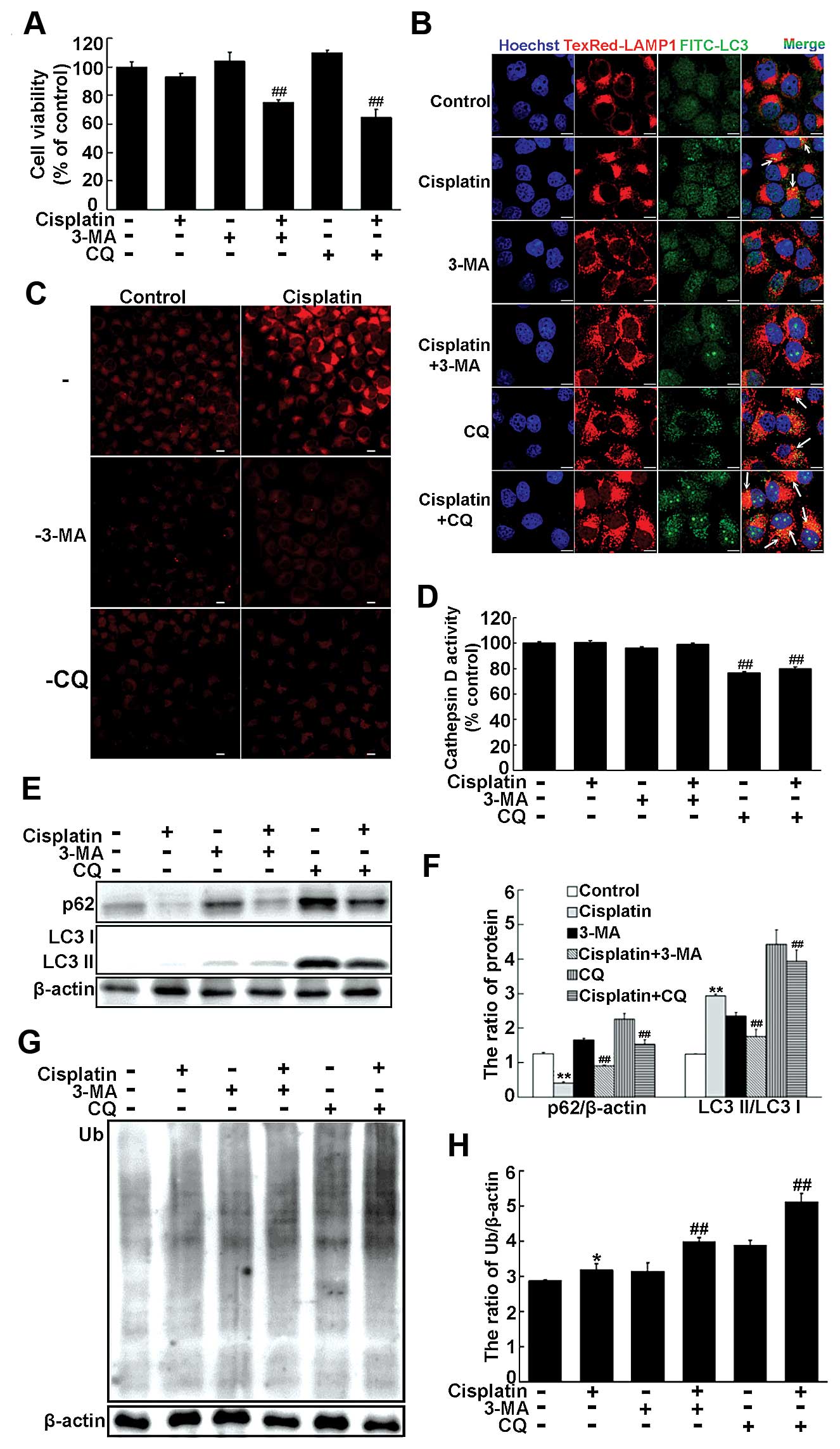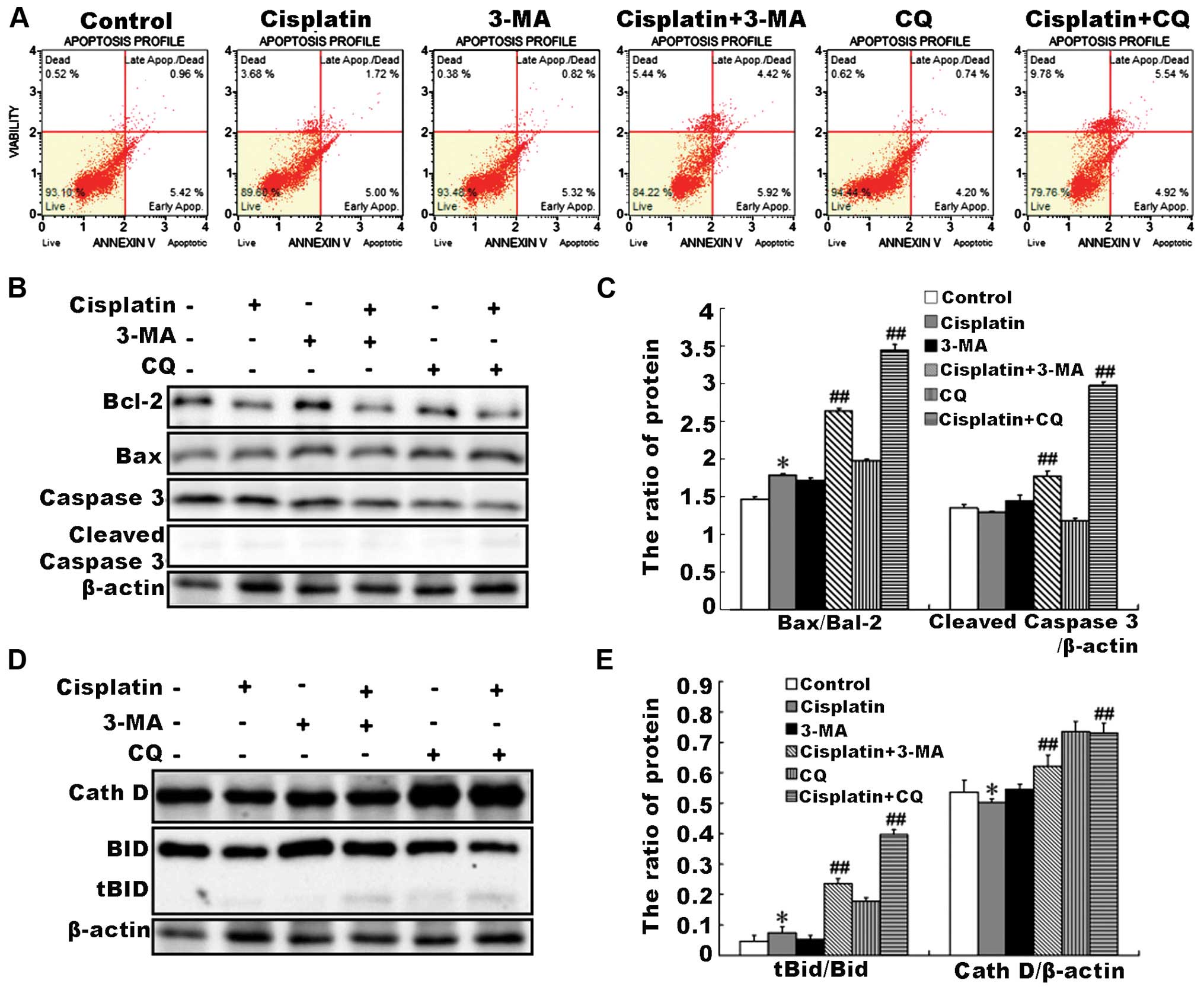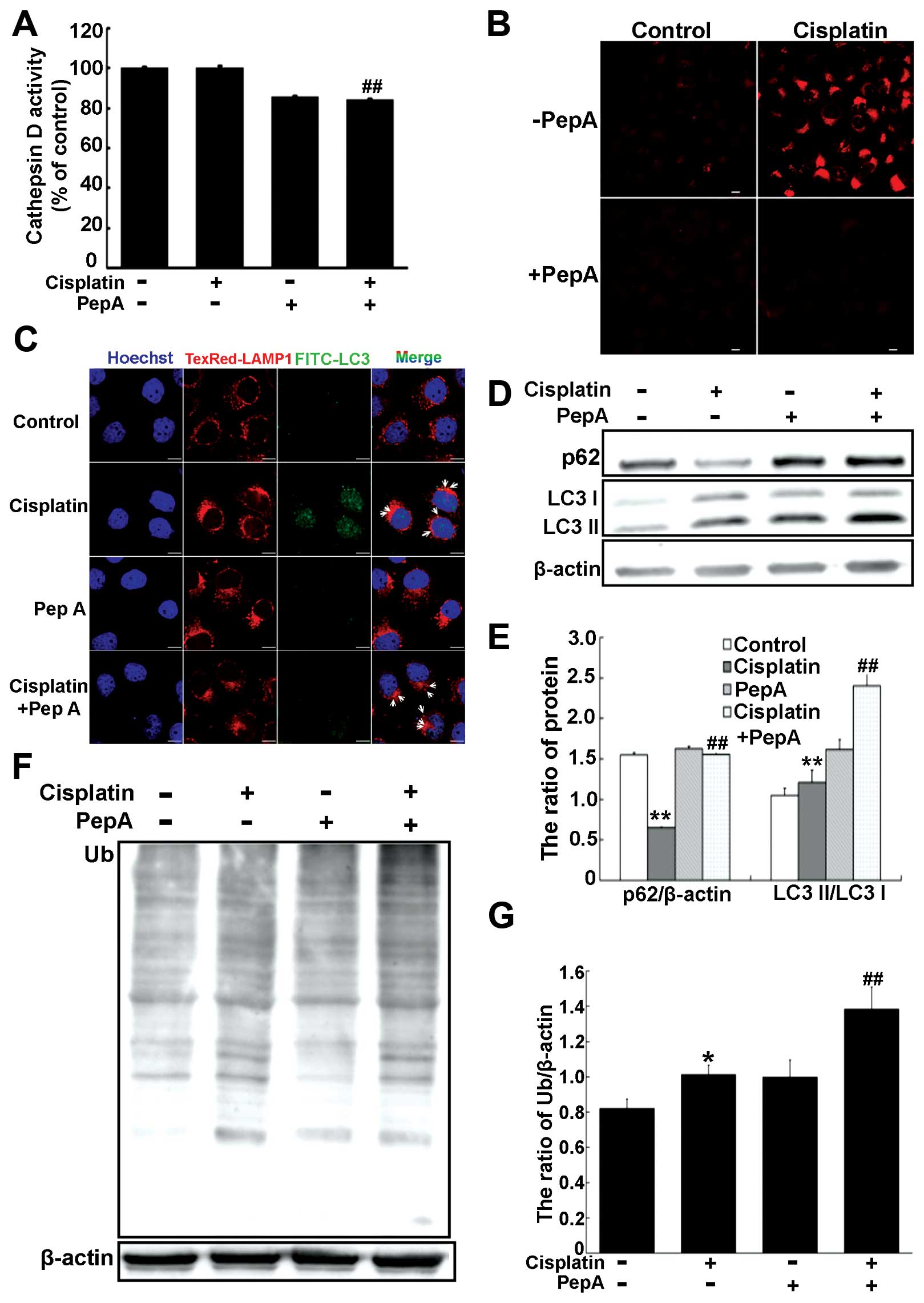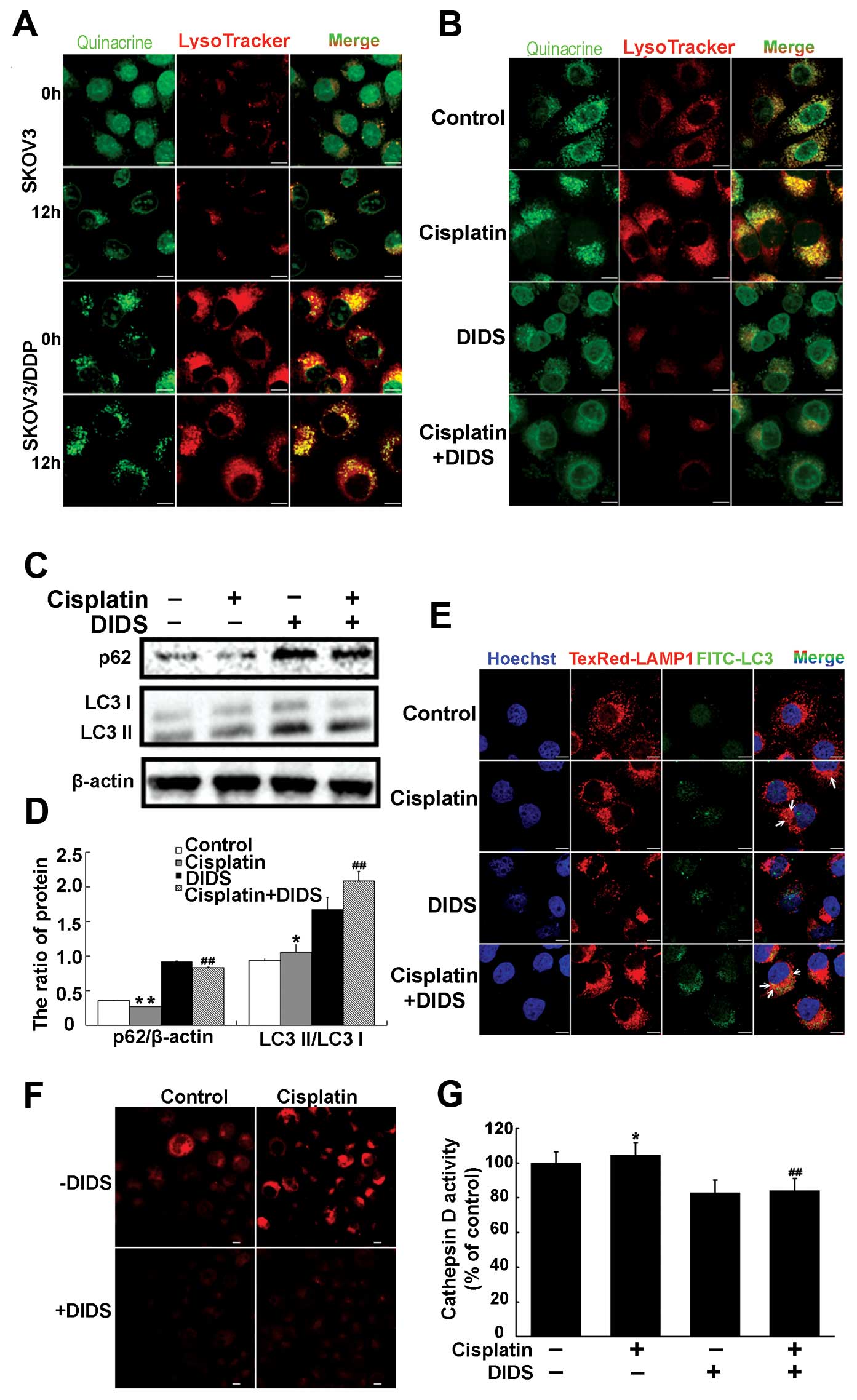|
1
|
Jemal A, Siegel R, Ward E, Hao Y, Xu J and
Thun MJ: Cancer statistics, 2009. CA Cancer J Clin. 59:225–249.
2009. View Article : Google Scholar : PubMed/NCBI
|
|
2
|
Shen W, Liang B, Yin J, Li X and Cheng J:
noscapine increases the sensitivity of drug-resistant ovarian
cancer cell line SKOV3/DDP to cisplatin by regulating cell cycle
and activating apoptotic pathways. Cell Biochem Biophys. Dec
16–2014.(Epub ahead of print). PubMed/NCBI
|
|
3
|
Yakirevich E, Sabo E, Naroditsky I, Sova
Y, Lavie O and Resnick MB: Multidrug resistance-related phenotype
and apoptosis-related protein expression in ovarian serous
carcinomas. Gynecol Oncol. 100:152–159. 2006. View Article : Google Scholar
|
|
4
|
Basu A and Krishnamurthy S: Cellular
responses to cisplatin-induced DNA damage. J Nucleic Acids.
2010:2013672010. View Article : Google Scholar : PubMed/NCBI
|
|
5
|
Wang J and Wu GS: Role of autophagy in
cisplatin resistance in ovarian cancer cells. J Biol Chem.
289:17163–17173. 2014. View Article : Google Scholar : PubMed/NCBI
|
|
6
|
Sun Y, Liu JH, Jin L, Sui YX, Lai L and
Yang Y: Inhibition of Beclin 1 expression enhances
cisplatin-induced apoptosis through a mitochondrial-dependent
pathway in human ovarian cancer SKOV3/DDP cells. Oncol Res.
21:261–269. 2014. View Article : Google Scholar : PubMed/NCBI
|
|
7
|
Zhang HQ, He B, Fang N, Lu S, Liao YQ and
Wan YY: Autophagy inhibition sensitizes cisplatin cytotoxicity in
human gastric cancer cell line SGC7901. Asian Pac J Cancer Prev.
14:4685–4688. 2013. View Article : Google Scholar : PubMed/NCBI
|
|
8
|
Xu N, Zhang J, Shen C, Luo Y, Xia L, Xue F
and Xia Q: Cisplatin-induced downregulation of miR-199a-5p
increases drug resistance by activating autophagy in HCC cell.
Biochem Biophys Res Commun. 423:826–831. 2012. View Article : Google Scholar : PubMed/NCBI
|
|
9
|
Kang R, Wang ZH, Wang BQ, Zhang CM, Gao W,
Feng Y, Bai T, Zhang HL, Huang-Pu H and Wen SX: Inhibition of
autophagy-potentiated chemosensitivity to cisplatin in laryngeal
cancer Hep-2 cells. Am J Otolaryngol. 33:678–684. 2012. View Article : Google Scholar : PubMed/NCBI
|
|
10
|
Klionsky DJ: Autophagy: From phenomenology
to molecular understanding in less than a decade. Nat Rev Mol Cell
Biol. 8:931–937. 2007. View
Article : Google Scholar : PubMed/NCBI
|
|
11
|
Wu WK, Coffelt SB, Cho CH, Wang XJ, Lee
CW, Chan FK, Yu J and Sung JJ: The autophagic paradox in cancer
therapy. Oncogene. 31:939–953. 2012. View Article : Google Scholar
|
|
12
|
Xu Y, Yu H, Qin H, Kang J, Yu C, Zhong J,
Su J, Li H and Sun L: Inhibition of autophagy enhances cisplatin
cytotoxicity through endoplasmic reticulum stress in human cervical
cancer cells. Cancer Lett. 314:232–243. 2012. View Article : Google Scholar
|
|
13
|
Yu C, Huang X, Xu Y, Li H, Su J, Zhong J,
Kang J, Liu Y and Sun L: Lysosome dysfunction enhances oxidative
stress-induced apoptosis through ubiquitinated protein accumulation
in Hela cells. Anat Rec (Hoboken). 296:31–39. 2013. View Article : Google Scholar
|
|
14
|
Yu H, Su J, Xu Y, Kang J, Li H, Zhang L,
Yi H, Xiang X, Liu F and Sun L: p62/SQSTM1 involved in cisplatin
resistance in human ovarian cancer cells by clearing ubiquitinated
proteins. Eur J Cancer. 47:1585–1594. 2011. View Article : Google Scholar : PubMed/NCBI
|
|
15
|
Korolchuk VI and Rubinsztein DC:
Regulation of autophagy by lysosomal positioning. Autophagy.
7:927–928. 2011. View Article : Google Scholar : PubMed/NCBI
|
|
16
|
Kroemer G and Jäättelä M: Lysosomes and
autophagy in cell death control. Nat Rev Cancer. 5:886–897. 2005.
View Article : Google Scholar : PubMed/NCBI
|
|
17
|
de Duve C: The lysosome turns fifty. Nat
Cell Biol. 7:847–849. 2005. View Article : Google Scholar : PubMed/NCBI
|
|
18
|
Rajapakshe AR, Podyma-Inoue KA, Terasawa
K, Hasegawa K, Namba T, Kumei Y, Yanagishita M and Hara-Yokoyama M:
Lysosome-associated membrane proteins (LAMPs) regulate
intracellular positioning of mitochondria in MC3T3-E1 cells. Exp
Cell Res. 331:211–222. 2015. View Article : Google Scholar
|
|
19
|
Carlsson SR, Roth J, Piller F and Fukuda
M: Isolation and characterization of human lysosomal membrane
glycoproteins, h-lamp-1 and h-lamp-2. Major sialoglycoproteins
carrying polylactosaminoglycan. J Biol Chem. 263:18911–18919.
1988.PubMed/NCBI
|
|
20
|
Chen JW, Pan W, D'Souza MP and August JT:
Lysosome-associated membrane proteins: Characterization of LAMP-1
of macrophage P388 and mouse embryo 3T3 cultured cells. Arch
Biochem Biophys. 239:574–586. 1985. View Article : Google Scholar : PubMed/NCBI
|
|
21
|
Eskelinen EL, Schmidt CK, Neu S,
Willenborg M, Fuertes G, Salvador N, Tanaka Y, Lüllmann-Rauch R,
Hartmann D, Heeren J, et al: Disturbed cholesterol traffic but
normal proteolytic function in LAMP-1/LAMP-2 double-deficient
fibroblasts. Mol Biol Cell. 15:3132–3145. 2004. View Article : Google Scholar : PubMed/NCBI
|
|
22
|
Kanai K: Biology of the mycobacterioses.
Some aspects of the lysosome-bacillus interaction in experimental
mouse tuberculosis. Ann N Y Acad Sci. 154(1 Biology of My):
177–193. 1968. View Article : Google Scholar : PubMed/NCBI
|
|
23
|
Zhou J, Tan SH, Nicolas V, Bauvy C, Yang
ND, Zhang J, Xue Y, Codogno P and Shen HM: Activation of lysosomal
function in the course of autophagy via mTORC1 suppression and
autophagosome-lysosome fusion. Cell Res. 23:508–523. 2013.
View Article : Google Scholar : PubMed/NCBI
|
|
24
|
Zhitomirsky B and Assaraf YG: Lysosomal
sequestration of hydrophobic weak base chemotherapeutics triggers
lysosomal biogenesis and lysosome-dependent cancer multidrug
resistance. Oncotarget. 6:1143–1156. 2015. View Article : Google Scholar :
|
|
25
|
Wang E, Lee MD and Dunn KW: Lysosomal
accumulation of drugs in drug-sensitive MES-SA but not
multidrug-resistant MES-SA/Dx5 uterine sarcoma cells. J Cell
Physiol. 184:263–274. 2000. View Article : Google Scholar : PubMed/NCBI
|
|
26
|
Braun M, Waheed A and von Figura K:
Lysosomal acid phosphatase is transported to lysosomes via the cell
surface. EMBO J. 8:3633–3640. 1989.PubMed/NCBI
|
|
27
|
Ishida Y, Nayak S, Mindell JA and Grabe M:
A model of lysosomal pH regulation. J Gen Physiol. 141:705–720.
2013. View Article : Google Scholar : PubMed/NCBI
|
|
28
|
Cao Q, Zhao K, Zhong XZ, Zou Y, Yu H,
Huang P, Xu TL and Dong XP: SLC17A9 protein functions as a
lysosomal ATP transporter and regulates cell viability. J Biol
Chem. 289:23189–23199. 2014. View Article : Google Scholar : PubMed/NCBI
|
|
29
|
Pillai S and Zull JE: Effects of ATP,
vanadate, and molybdate on cathepsin D-catalyzed proteolysis. J
Biol Chem. 260:8384–8389. 1985.PubMed/NCBI
|
|
30
|
Aits S and Jäättelä M: Lysosomal cell
death at a glance. J Cell Sci. 126:1905–1912. 2013. View Article : Google Scholar : PubMed/NCBI
|
|
31
|
Foghsgaard L, Wissing D, Mauch D, Lademann
U, Bastholm L, Boes M, Elling F, Leist M and Jäättelä M: Cathepsin
B acts as a dominant execution protease in tumor cell apoptosis
induced by tumor necrosis factor. J Cell Biol. 153:999–1010. 2001.
View Article : Google Scholar : PubMed/NCBI
|
|
32
|
Sathe MN, Woo K, Kresge C, Bugde A,
Luby-Phelps K, Lewis MA and Feranchak AP: Regulation of purinergic
signaling in biliary epithelial cells by exocytosis of
SLC17A9-dependent ATP-enriched vesicles. J Biol Chem.
286:25363–25376. 2011. View Article : Google Scholar : PubMed/NCBI
|
|
33
|
Yu L, McPhee CK, Zheng L, Mardones GA,
Rong Y, Peng J, Mi N, Zhao Y, Liu Z, Wan F, et al: Termination of
autophagy and reformation of lysosomes regulated by mTOR. Nature.
465:942–946. 2010. View Article : Google Scholar : PubMed/NCBI
|
|
34
|
Kelland L: The resurgence of
platinum-based cancer chemotherapy. Nat Rev Cancer. 7:573–584.
2007. View Article : Google Scholar : PubMed/NCBI
|
|
35
|
Amaravadi RK, Yu D, Lum JJ, Bui T,
Christophorou MA, Evan GI, Thomas-Tikhonenko A and Thompson CB:
Autophagy inhibition enhances therapy-induced apoptosis in a
Myc-induced model of lymphoma. J Clin Invest. 117:326–336. 2007.
View Article : Google Scholar : PubMed/NCBI
|
|
36
|
Sagulenko V, Muth D, Sagulenko E,
Paffhausen T, Schwab M and Westermann F: Cathepsin D protects human
neuroblastoma cells from doxorubicin-induced cell death.
Carcinogenesis. 29:1869–1877. 2008. View Article : Google Scholar : PubMed/NCBI
|
|
37
|
Shingu T, Fujiwara K, Bögler O, Akiyama Y,
Moritake K, Shinojima N, Tamada Y, Yokoyama T and Kondo S:
Inhibition of autophagy at a late stage enhances imatinib-induced
cytotoxicity in human malignant glioma cells. Int J Cancer.
124:1060–1071. 2009. View Article : Google Scholar
|
|
38
|
Boya P and Kroemer G: Lysosomal membrane
permeabilization in cell death. Oncogene. 27:6434–6451. 2008.
View Article : Google Scholar : PubMed/NCBI
|
|
39
|
Benes P, Vetvicka V and Fusek M: Cathepsin
D - many functions of one aspartic protease. Crit Rev Oncol
Hematol. 68:12–28. 2008. View Article : Google Scholar : PubMed/NCBI
|
|
40
|
Yin L, Stearns R and González-Flecha B:
Lysosomal and mitochondrial pathways in
H2O2-induced apoptosis of alveolar type II
cells. J Cell Biochem. 94:433–445. 2005. View Article : Google Scholar
|
|
41
|
Diment S, Martin KJ and Stahl PD: Cleavage
of parathyroid hormone in macrophage endosomes illustrates a novel
pathway for intracellular processing of proteins. J Biol Chem.
264:13403–13406. 1989.PubMed/NCBI
|
|
42
|
Vasiljeva O, Reinheckel T, Peters C, Turk
D, Turk V and Turk B: Emerging roles of cysteine cathepsins in
disease and their potential as drug targets. Curr Pharm Des.
13:387–403. 2007. View Article : Google Scholar : PubMed/NCBI
|
|
43
|
Kuester D, Lippert H, Roessner A and
Krueger S: The cathepsin family and their role in colorectal
cancer. Pathol Res Pract. 204:491–500. 2008. View Article : Google Scholar : PubMed/NCBI
|
|
44
|
Miao HQ, Liu H, Navarro E, Kussie P and
Zhu Z: Development of heparanase inhibitors for anti-cancer
therapy. Curr Med Chem. 13:2101–2111. 2006. View Article : Google Scholar : PubMed/NCBI
|
|
45
|
Hah YS, Noh HS, Ha JH, Ahn JS, Hahm JR,
Cho HY and Kim DR: Cathepsin D inhibits oxidative stress-induced
cell death via activation of autophagy in cancer cells. Cancer
Lett. 323:208–214. 2012. View Article : Google Scholar : PubMed/NCBI
|
|
46
|
Tatti M, Motta M, Di Bartolomeo S,
Cianfanelli V and Salvioli R: Cathepsin-mediated regulation of
autophagy in saposin C deficiency. Autophagy. 9:241–243. 2013.
View Article : Google Scholar :
|
|
47
|
Tatti M, Motta M, Di Bartolomeo S, Scarpa
S, Cianfanelli V, Cecconi F and Salvioli R: Reduced cathepsins B
and D cause impaired autophagic degradation that can be almost
completely restored by overexpression of these two proteases in Sap
C-deficient fibroblasts. Hum Mol Genet. 21:5159–5173. 2012.
View Article : Google Scholar : PubMed/NCBI
|
|
48
|
Zhang Z, Chen G, Zhou W, Song A, Xu T, Luo
Q, Wang W, Gu XS and Duan S: Regulated ATP release from astrocytes
through lysosome exocytosis. Nat Cell Biol. 9:945–953. 2007.
View Article : Google Scholar : PubMed/NCBI
|
|
49
|
Huang P, Zou Y, Zhong XZ, Cao Q, Zhao K,
Zhu MX, Murrell-Lagnado R and Dong XP: P2X4 forms functional
ATP-activated cation channels on lysosomal membranes regulated by
luminal pH. J Biol Chem. 289:17658–17667. 2014. View Article : Google Scholar : PubMed/NCBI
|















